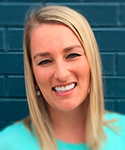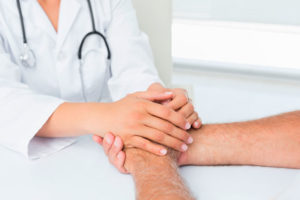October 17th, 2017
Be Human. Be Memorable.
Karmen Wielunski, DO

Karmen Wielunski, DO, is a 2017-18 Chief Resident in Internal Medicine at the Medical College of Wisconsin in Milwaukee, WI
My dad died on May 11, 2003. It was Mothers’ Day. I was 18 years old. Those are the easy facts. The more difficult ones are those detailing the events that led to his death. My dad was so many things — a brilliant geologist, a loving father, an inventor, a pilot, and a Vietnam veteran — to name a few. He survived three tours on the front lines in Vietnam, but he didn’t come out unscathed. He was a victim of post-traumatic stress disorder and, subsequently, progressive alcoholism. Despite numerous attempts by my family to help him, and treatment in every form imaginable, we watched a truly amazing person become engulfed in a vortex of pain and sadness. One night he fell. There was intracranial bleeding, seizures, and then irreversible hypoxic brain injury. It was  traumatic, unexpected, and life-changing for me and many others.
traumatic, unexpected, and life-changing for me and many others.
Memories and Questions
I started residency more than 10 years later. Just like every other resident, I spent busy days and nights in the hospital caring for countless patients with umpteen ailments. I also spent a lot of time working in the ICU. Unsurprisingly, my ICU patients frequently triggered recollections of my dad’s last hours in a similar setting. I very vividly remember him lying on an ICU bed connected to a ventilator. He was slightly turned on his left side, and had thick, white dressings around his head. I remember a nurse entering his room and quietly saying, “Tim, I’m going to give you some Tylenol now for your fever.” At the time I thought it was odd that she was explaining this to him. At 18 years old, I knew what ‘no meaningful brain activity’ meant, and I knew she did too. But, at the same time, her gesture was comforting to me.
The more I cared for critically ill patients during residency, the more I started thinking about the providers who took care of my dad. I wouldn’t call it critical thinking by any means — more like nonchalant, stream-of-conscious thinking as I walked from one patient unit to another. I wondered, ‘Were there internal medicine residents similar to myself? Were they really tired? Was there a critical care fellow? If so, was he or she a jovial fellow? I hope so – I like jovial critical care fellows.’ These random thoughts continued for years. But, the more I wondered, the more apparent it became that I actually didn’t remember any of the physicians who took care of my dad. The only person I remembered was the nurse who gave him Tylenol. Initially, this was a surprising realization. In a situation where likely countless physicians, residents, students, and therapists participated in my dad’s care, how was it possible that I only remembered one person?
Humans and Answers
The answer actually came to me via Twitter. In a post on September 22, 2017, Mark Reid, MD (@medicalaxioms), wrote, “When you run out of doctor things to do for the sick person, see if there are any human things you can offer.” Though seemingly simple advice, this resonated with me. It reminded my of my dad’s nurse. Due to the severity of his injuries after his accident, we quickly ran out of medical things to do. The nurse, however, still took it upon herself to do human things. The Tylenol she had to give was medically useless, but she used its administration as a venue to express care from one human to another. She called my dad by his name. She explained to him what she was doing and why she was doing it, and she didn’t judge his situation. Even her soft tone of voice was a much-needed juxtaposition to the chaos that had occurred up to that point. Even if it took me years to fully realize it, all of this mattered to me. Actually, it still matters to me now. 
I’m sure that the other members of my dad’s care team were also great. I realize that circumstance and time likely also play large roles in my inability to recollect specific people at that time. However, I do think the concept of ‘doing human things’ is important to remember throughout medical training and practice. Our chosen careers often place us in a position of being participants in difficult, life changing events of patients and their family members. We won’t always have the answers. Even when we do have the answers, we won’t always have the solutions. But, we can always be human. And, as I can attest, even the smallest human acts can have a lifetime of impact.
Check out this NEJM article for a great review on post-traumatic stress disorder



Great article and perfect writing
If we go back to the history in 1952 when they were call it stress reaction disorder “ human catastrophe” till these days when they do the studies, they did them in high income countries, the question that we have to ask ourselves, is there PTSD in 3rd world country, or countries that witnissed massive destruction?
Is this disorder created by us”human”
Thank you in advance
These are great questions! I think we often get caught up in trying to fix the disease, but forget to think about fixing the underlying cause of the disease. I hope one day we do see a world that is rid of human driven catastrophe. But, in the meantime, I’m also hopeful for the extensive, ongoing research dedicated to helping people who are already suffering from previous, unfortunate circumstances. Thanks for reading!
Veterans refer to the condition as PTS. Their reasoning: we do not use ‘automobile accident disorder’ to refer to auto accident injuries.
I had an ‘interesting’ discussion with Robert Spitzer on this issue when I began my fellowship in child psychiatry epi during the mid-90’s. He said I’d better learn a few things, and that he’d advise my mentor regarding my deficient perspective. A decade latter, Spitzer realized I was correct: our environment has profound effects on mental health, and only some of our environment is under our personal control.
You are spot on that the focus of concern is for elites: people in developing nations, war-torn nations and foster care/unaccompanied children routinely experience PTS, and are expected to just get on with their lives if possible. We have great room for improvement .. . .
I love the advice to do human things . . . whenever we can . . .
This is great, Karmen. Thanks for writing. More and more, these human interactions seem to be the parts of the day I (and I think my patients) take the most value from. We should find ways to celebrate these moments with our learners. Thanks again.
Thanks, Dr. Muntz. I completely agree. As teachers, we have a duty to impart clinical knowledge, skills and much, much more to our learners (and patients). Sometimes I think the ‘much, much more’ part is done, but not formally addressed. Finding ways to address and, as you say, celebrate these things is incredibly important. Thanks for reading!
Beautiful. Yes, in my experience as a physician, the relationships that we develop with patients and their families are an integral aspect of compassionate healthcare. Certainly, our medical expertise is essential, but it is somewhat hollow without meaningful connections with patients, families, our communities and our peers.
Very well put. I couldn’t agree more.
Karmen,
This is a beautiful essay, with a truly deep message to all.
I believe that care of a patient is not comprised of sharp edges and only guidelines- being human, as you say, is what matters. Medicine is a spectrum.
That excellent, precise, accurate surgery and medicine must be practiced goes without saying. But in all of us should be an ability and willingness to go that extra step. To comfort. To hold a hand, listen, to leave our patients and their families with, as in you, a lifetime of knowledge that someone truly cared.
Thank you.
Karmen, thanks a lot for the realizations u shared. I got answers I think for. Views and opinions from both as caregivers and physicians really made me more HUMAN now.
Karmen…wonderful article. I am teary. I remember a nurse holding my hand during childbirth. A small gesture maybe. It meant everything! Therefore, with that in mind, I held David’s hand for the majority of his last 72 hours.
Thank you, Mrs. Ament. I think we spend many of those last hours reflecting on a lifetime of memories. Maybe a gift we realize a bit later is that, within those last hours, we also end up making some of our most important memories.